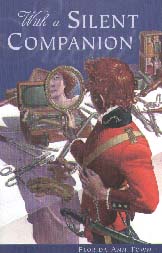|
________________
CM . . . .
Volume VI Number 21 . . . . June 23, 2000
excerpt: Margaret had never met her Uncle James. Once he left Ireland he never returned....To be starving poor is never easy, but to be as well a woman, particularly an Irish woman in the latter half of the 18th century, was to be condemned to a very unpleasant life indeed. This book takes the well documented story of a Dr. James Barry who, over a period of 50 years, was a surgeon in the British Army in Africa, the Caribbean, and Canada, and who, on his death, was discovered to be a woman and concatenates it with that of one Margaret Bulkley, niece of the society artist James Barry, making a very convincing case for the two being one and the same person. Margaret began life in Dublin as the daughter of a reasonably well-to-do grocer and got a very good beginning to her education there. Her father was defrauded of his money by his son, Margaret's brother, and thrown into debtor's prison, whereupon Margaret and her mother went off to London to see if Barry, the artist and Margaret's uncle, had any family feeling at all. As it turned out, he hadn't much and was ill besides, but he had a couple of patrons who became interested in Margaret and her mother. One was General Miranda of Venezula who had hopes of overthrowing the Spaniards in his homeland and restoring local rule and who thought that Margaret might be useful to him as a doctor for his troops. To get training, however, she would have to be thought to be a man, and so they planned her disguise and helped her begin her studies at the University of Edinburgh with her mother acting as her housekeeper. Uncle James had died, and his estate was managed by Mrs. Bulkley. This situation afforded them some money, but not a great deal, his paintings being by then quite unfashionable. By the time Margaret had finished her training as a surgeon, however, Miranda's attempt to seize power in Venezula had failed, and so she enlisted in the British army as a doctor, one fighting force being as good as another, apparently. Except that, her mother now being dead, Margaret had no one in whom she could confide or with whom she could be a woman. The title's silent companion is the succession of little dogs, all called Psyche, who shared her quarters for the rest of her life. The story so far is largely fiction, though the epilogue gives reasonable grounds for the basic assumptions in it. After joining the army, James Barry's life is fairly well documented, and so the book becomes somewhat more of a biography and less of a novel. It was an interesting life, however, and well worth looking at - she/he served almost all over the world, continued to keep up with medical discoveries, such as the use of an anesthetic for operations and the role that cleanliness and good diet play in maintaining healthy soldiers. (In this she was at one with Florence Nightingale, but they met only once, and neither much took to the other!) In Canada she was based in Ottawa but with responsibilities for all the military hospitals in Upper and Lower Canada - she certainly showed that women were capable of both medicine and administration! I found this a most interesting book. The novel-like beginning is engaging, and the biographical details of the latter half of the book fascinating, so much so that I found the additions of James's muttered comments to her dog intrusive rather than enlivening. The epilogue, with its details of how the stories came together and the justification for their union, reads rather like a detective story and is an example of just how historical research is carried out. The final coup on the part of the author was the opinion of a hand-writing expert that letters known to be written by Margaret and ones written by Barry were penned by the same hand! It is hard not to be convinced. Highly Recommended. Mary Thomas works in two elementary school libraries in Winnipeg, MB.
To comment on this title or this review, send mail to cm@umanitoba.ca.
Copyright © the Manitoba Library Association.
Reproduction for personal use is permitted only if this copyright notice
is maintained. Any other reproduction is prohibited without
permission.
Published by
TABLE OF CONTENTS FOR THIS ISSUE - June 23, 2000.
AUTHORS |
TITLES |
MEDIA REVIEWS |
PROFILES |
BACK ISSUES |
SEARCH |
ORDER |
CMARCHIVE |
HOME
|
